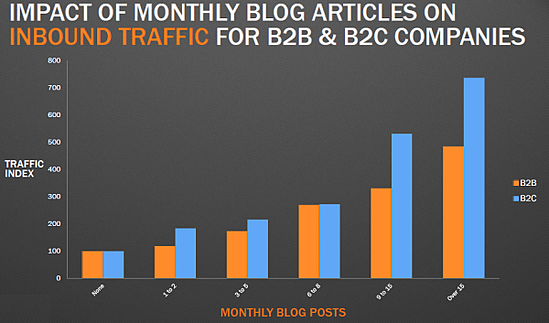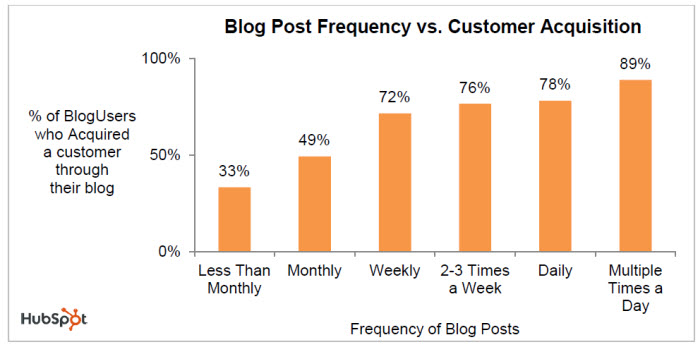There’s always been a lot of debate about content quality vs. quantity and frequency in content marketing practitioner circles. Consequently, most of the advice given revolves around the position that quality trumps quantity. However, the fact is, both are essential for a successful content marketing strategy.
You’ll find it difficult to get any traction with a slow or inconsistent publication schedule, even if the quality of your content is consistently high. A one-off piece with great content is unlikely to do any good for your brand and business in the long term.
Why Frequent, Consistent Content Publication Is Vital for Success
Sticking to a consistent content production schedule and publishing regular, frequent content is one of the simplest ways to ensure your content marketing efforts pay off.
Research by Hubspot shows that brands that publish at least four blog posts per week receive five times more site traffic than those that publish less than once a week.

Another study of over 400 business marketers by Curata found that over 90 percent of the most successful business blogs publish new content at least once a week.
While you shouldn’t be publishing sub-par content, it’s hard to deny the benefits that come from a quantity-focused strategy. Essentially, the more content you can get out there, the better. Just as money saved in a bank will collect increasing amounts of interest, content marketing offers compounding returns.
Here are some of the benefits that come with publishing lots of content on a regular basis:
- It increases organic traffic through sheer volume. (More content means more keywords and more chance your content will come up in a user search.)
- It creates more opportunities for a single piece of content to become popular and even go viral. (There’s no fixed formula for guaranteeing a piece of content will take off, but every piece you publish gives you another chance at going big.)
- It attracts regular visitors back with new content, especially when you stick to a schedule and they know when to expect it.
- It boosts audience engagement by giving your followers more content to interact with.
- It generates more leads. (Companies with over 200 blog articles generate five times as many leads than those with 10 or fewer blog posts.)
- It creates more potential for sharing on social media.
- A bigger bank of content on your site gives more for visitors to explore, helping to keep them on your site for longer.
- It builds brand awareness and visibility. (Ever noticed that a particular brand seems to be everywhere online and on social media? They get there through publishing lots of content.)
- It boosts brand awareness and trust. (If you have weekly blog posts going back for years, people can see you’re an established company that is reliable and delivers good work consistently.)
- Recently published content gives you a “fresh content” SEO boost.
- A consistent publication schedule is also important for SEO. (Publishing once a week for a year is much more beneficial than posting dozens of articles over a few days and then not publishing anything else for a couple of months.)
- Regularly producing content improves the quality of your content, too, as your writers hone their skills and your production process becomes more streamlined and efficient.
- Publishing a lot of content also helps you to refine your content over time as analytics from each piece will give you more information about what resonates with your audience.
- Publishing more content gives you the opportunity to produce content covering a greater variety of topics to appeal to a wider audience.

Why Planning Is Key for Maintaining a Frequent Posting Schedule
Large companies with dedicated content teams and big budgets will obviously find it easier to post content frequently than smaller companies with fewer resources. But, even small companies can up their posting rate by prioritizing efficiency and getting organized.
If you only have a small team or perhaps you’re a team of one who is solely responsible for your organization’s content marketing, it’s critical to plan in advance.
Brainstorming, content planning, and gathering research material to have instantly on hand later will speed up blog postproduction time.
Planning out time to create and publish your content with a content calendar and being strict about sticking to this schedule will help keep you on track and ensure that content production doesn’t get constantly pushed back in favor of other tasks.
If you’ve previously taken more of a scattershot approach to creating and publishing content, it may seem overwhelming to plan out more than one post at a time, but the basic process is simple:
- Set goals for your content marketing efforts – what do you want to achieve in terms of traffic, lead generation, and engagement over the next six months or a year?
- Research and define your audience so you know what type of content you should be creating.
- Decide what types of content you will focus on – informational blog posts, how-to guides, in-depth e-books and white papers, videos, etc.
- Set a consistent posting schedule. This may be daily, weekly, or however often you have the resources to commit.
- Brainstorm content topics and generate blog post ideas based on your audience research.
- Add your content ideas to your content calendar, including time for content production and promotion.
Take Advantage of Automation Technology to Increase Your Content Pipeline
One way you can scale up your content marketing without a huge budget is by investing in an automation platform to take some work off your team.
Content automation solutions enable you to run repetitive tasks on autopilot and trigger actions based on set events. For example, you could use an automation platform to post a notification to all your social media accounts whenever you publish a new blog post.
These tools can remove a lot of the time-consuming tasks involved with content marketing, leaving you free to spend more of your time on creativity and strategic planning.
Finding the Balance Between Quality and Quantity
It’s not always necessary to hugely ramp up your content production in order to see the benefits. Being consistent with your posting schedule is more important than simply publishing more. However, even just adding one more post a week than you’re currently doing should make a huge difference to your results.
By becoming more efficient in your content production by using a content calendar and taking advantage of automation technology, this goal should be easily achievable for most companies.
DivvyHQ helps businesses like yours to increase their content production by streamlining workflow, simplifying planning, and automating repetitive tasks. To find out more, get in touch to request a demo, or sign up for your free trial today.